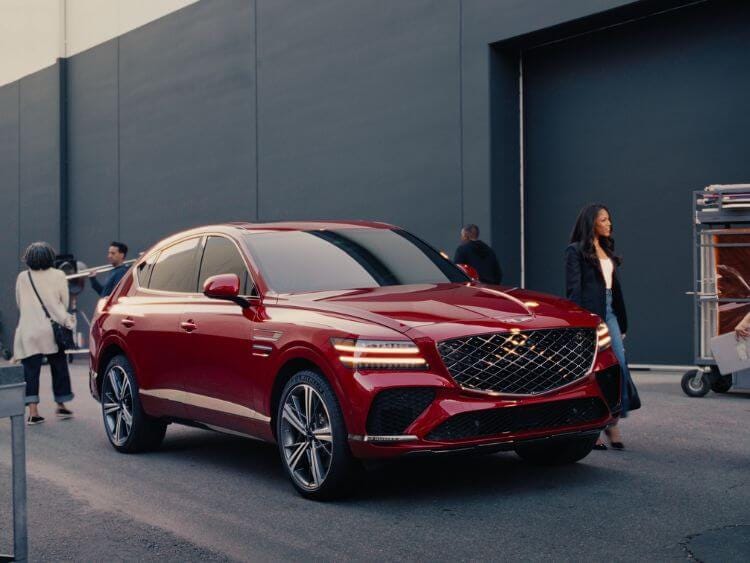Photo Credit: Genesis.
Note from Mack: This post is a special guest post from the one and only
! Please follow Neela and subscribe to her Substack, she’s my favorite writer on Substack and my favorite person too!It was just before the pandemic when we leased the Genesis. We had a 39-month lease, with a six-month extension tacked on, because the market had become fiercely competitive. Prices were absurd. Leasing or buying felt like financial dares. But by the end of 2023, we finally leaped.
Practicality wrapped in a bit of indulgence, marking twenty-one years in America with our first costly purchase.
I gave up my own car back in June 2020. Everything had gone remote, and two vehicles felt unnecessary. Still, the Genesis was something else. It was the kind of car that makes sense even if you don't speak fluent horsepower - elegant, intuitive, and with quiet confidence on wheels.
Betsy (because, of course, we named her) was finally ours.
The Math of Belonging
Back home in Trinidad, we didn't have a word for "upgrade."
Things were simply "broken" or "working." My grandmother's sewing machine, the one she received as a wedding gift in 1952 or something, still hums through denim and silk alike. I saw it at my cousin's house when I visited in December 2024.
My grandfather's old radio still works even though parts were probably replaced hundreds of times. In that world, to replace something functional was to admit defeat in the battle against time. Objects weren't status symbols but companions across generations.
The first time my aunt-in-law visited our apartment in New York City, she counted our appliances with the look Catholics reserve for counting mortal sins.
"Seven?" she whispered, part horrified, part impressed. I tried to explain that they mostly came with the apartment, and we never used the dishwasher. In her kitchen back home, she had exactly three appliances: a refrigerator, a stove, and a mixer so ancient that it predated warranties.
"But what happens when they break?" she asked, running her finger along our gleaming coffee maker.
"The landlord takes care of it. He buys new ones," I answered, and watched her wince.
"What a strange country," she said, "where things are born to die."
Oh, you don't know the half of it, Auntie.
You see, minimalism was never a doctrine in our home. It was a default setting. Not austere, not performative, just quietly rooted in survival. For the first two years in America, our furniture came from sidewalks and Goodwill bins — our clothes were from outlet malls. Our dishes mismatched, our books borrowed, not by choice, but by necessity.
For years, every purchase went through what I came to think of as The Tribunal.
Do we need it?
Will it last?
Is this the smartest use of our money?
We weren't ascetics. We enjoyed little luxuries. But joy, for us, was found more often in shared experiences than shiny objects. A good meal, a road trip, a conversation that lingered, those held value.
Things? Things had to earn their keep.
Desire, in this equation, was a luxury we believed belonged to someone else. Beauty was something to admire from a distance, an indulgence that felt out of reach or even frivolous.
However, America is not a country designed for function over form. Here, consumption isn't just economic but almost linguistic. The brands you choose form sentences about who you are, what you value, and where you belong in the vast machinery of class and culture. It's a language I learned slowly and painfully, like conjugating verbs in a classroom while everyone else spoke it as a mother tongue.
What Things Say About Us
A few weeks ago, I was watching the LA version of Suits when I spotted it — our car. Not my actual Genesis, of course, but her more expensive twin, driven by one of the show's lawyers with the casual confidence that tells you it's not just a vehicle but more a character trait.
I paused the screen and stared.
The Genesis made perfect sense for that character.
Understated luxury, sophisticated but not screaming for attention. Expensive enough to whisper success but subtle enough to dodge suspicion. Hmmm, this car says something.
So, what was I trying to say when I bought it? And, more importantly, who was I trying to say it to?
After two decades in America, was I finally fluent in consumption, or was I just repeating phrases I'd overheard?
I used to roll my eyes at product placement- the soda can turned label-out, the clunky dialog praising "best-in-class safety features." But Suits handled it differently. The Genesis didn't feel like a commercial. It felt inevitable.
That's good marketing, so seamless that you mistake it for storytelling — or worse, self-expression.
There is a long history of brands excelling in this area.
When E.T. followed a trail of Reese's Pieces, sales shot up 65%.
James Bond's BMW Z3 debut in GoldenEye? Preorders topped 9,000 within a month.
And who could forget Tony Stark's Audi R8 — an instant rebranding of the car as bold, stylish, and unmistakably cool.
Genesis has been taking notes. Their placement in Suits LA was more than a marketing play. It was an identity alignment. By pairing the car with a character who exudes quiet competence, Genesis signaled exactly who it's for. The person who doesn't need to peacock their success but still wants to feel it, reflected in polished chrome and stitched leather.
A Memory in Chrome and Leather
Last summer, I took our cousin's teenage son for a drive along the Pacific Coast Highway, also known as the PCH. He was visiting SoCal for a few days. He ran his hand over the Genesis's leather seats with the reverence usually reserved for holy relics.
"This is what they mean by the American Dream?" he asked.
I wanted to give him some noble answer about opportunity and possibility, about how the Dream was bigger than German engineering wrapped in Korean luxury. But watching his face in the rearview mirror, I realized he wasn't really asking about the car. He was asking about arrival, about belonging, about the right to want something simply because it was beautiful.
"Sometimes," I answered honestly.
That night, I found him sitting in the driver's seat of the parked Genesis, hands at ten and two, going absolutely nowhere. "One day," he whispered to himself, and I recognized that hunger immediately. Not for the car itself, but for what it represented: the luxury of desire, the permission to want something without justifying it through The Tribunal.
It was the same hunger that had driven me for decades. The same hunger that had finally been sated, not by the Genesis, but by the ability to choose it. By the luxury of desire itself.
The First Real Thing
Our first car came as a hand-me-down from a cousin in New York who was moving back home. It was so old that the paint peeled like sunburnt skin. But we didn't care.
We were too busy surviving. We were measuring miles in hope, not horsepower.
Acura Integra - Our first vehicle in America
When the transmission finally died on a highway somewhere in New Jersey, I felt guilty for the relief. Not because we'd have to spend money we didn't have, but because finally, we had permission to want something better.
Where I come from, nothing ever truly dies.
Cars become taxis, taxis become delivery vehicles, delivery vehicles become spare parts. Everything gets nine lives, each one more creative than the last. Waste is a sin, and replacement is admission of defeat.
But in America, replacement isn't failure - it's progress.
New isn't wasteful - it's aspirational.
The Genesis was the first purchase that broke that cycle. It wasn't replacing anything that was broken; it was a logical, beautiful choice. And for once, that was reason enough.
The Arrival Fallacy
Twenty-two years ago, fresh off the plane, I thought I understood what it meant to "make it" in America. A stable income. A safe home. A reliable car with AC that worked.
The Genesis in my driveway checks those boxes.
But then I think of Suits. The lawyer driving the Genesis? The whole show is built around a lie, imposters in tailored suits pretending they belong. And isn't that what arrival often feels like?
A performance? A borrowed outfit? A fear that someone will ask for your receipts?
That's the thing about the American Dream. It promises arrival. But rarely tells you that arrival isn't a destination but a recurring illusion.
And maybe that's what Genesis is. Not just a car but a mirror. A declaration wrapped in leather and chrome.
It's real metal, yes. Real money. But it's also the curated image of a life well-lived
Even if I didn't write the script, I chose to deliver the line. And maybe that, too, is a kind of freedom.
Last week, I found a small scratch on the Genesis's door, probably from a shopping cart or another car's door in a tight parking space. In my first culture, I would have left it a minor battle scar that was not worth the expense of fixing. But in my American skin, I immediately researched touch-up paint.
And somewhere between these two responses lies the truth of who I've become: a person fluent in two languages of consumption, code-switching between necessity and desire, function and form.
So yes, I bought a Genesis. But in many ways, Genesis bought me too. It bought my right to consume conspicuously without apologizing, to want things simply because they're beautiful, to participate in the elaborate theater of American materialism without feeling like an imposter.
They say you can't take it with you when you die. But no one mentions what happens when you cross borders while still alive, how some things get left behind, while others, like the peculiar joy of buying something simply because it's beautiful, get picked up along the way. Call it emotional smuggling, if you will. Or maybe just call it Betsy, purring in the garage, worth every penny and none at all.
Thank you for taking the time.
Backstage Pass teaches you how to better connect with your customers, readers, clients, or donors. The lessons shared here draw on my experience over the last 20 years building customer engagement strategies for companies like Adobe, Dell, Club Med, Ingersoll-Rand, and countless others. I give you real-world research, examples and tactics that show you how to create customer engagement efforts that drive real business growth.
The Brand Diaries: In N Out Burger
A note from Mack: This is the first edition of The Brand Diaries! The Brand Diaries will feature some of my favorite people on Substack talking about their favorite brand. And Neela is my favorite person of all on Substack, so it is an honor to have Neela kick off The Brand Diaries by telling us the story of why she loves In-N-Out Burger:









Thank you for being such a kind and generous host, bro.
I truly appreciate you.
Neela, Only you could write a story about buying a car and make it interesting. 🙏🏽